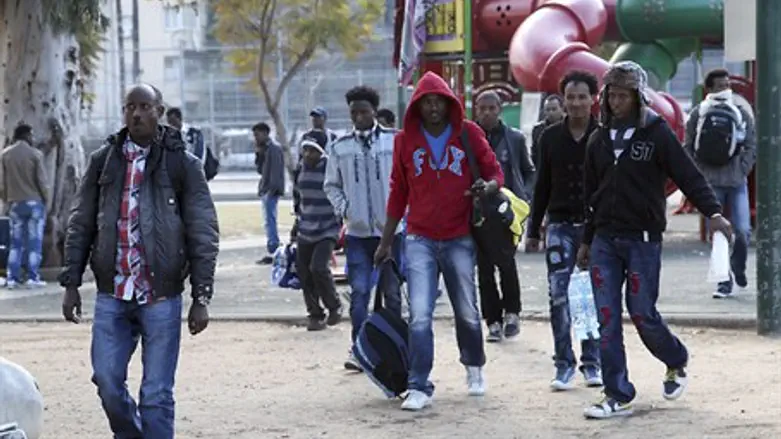
After the Knesset approved a very watered down version of the Infiltrator Law last month, the High Court once again stepped in to block the law on Thursday for the third time running.
The High Court issued a temporary order preventing the implementation of the recently amended law; the state will be required to respond to the temporary order within ten days.
Due to the order, illegal infiltrators will be not brought to the Holot open detention facility in the Negev, and likewise they will not be transferred to the Saharonim closed facility.
According to the watered down law that was recently passed, infiltrators were to be held for three months at Saharonim, and then transferred to Holot for up to 20 further months.
NGO Israeli Immigration Policy Center's director Orli Yogir responded to the decision, saying "this is an awful decision. The temporary order that the High Court issued harms the Israeli democratic foundation and leaves the state of Israel without the ability to defend its sovereignty from illegal immigration."
"Those who will pay the price of this abandonment are citizens of the state of Israel, and residents of southern Tel Aviv in particular," noted Yogir.
The issue of the tens of thousands of illegal infiltrators is a serious one, particularly in southern Tel Aviv where residents are exposed to endless crime, with many Jewish residents saying they are terrified of leaving their homes and begging the government to take action.
It has been shown that the detention facilities led to a remarkable drop in crime in Tel Aviv, which the High Court ruling could see reversed.
While leftist organizations have claimed the infiltrators are refugees, figures presented by the state have shown the overwhelming majority of them are not refugees, but rather work migrants breaking the law in a search of greater job opportunities.
That assessment was given resounding backing this month by a special research delegation of the Danish Immigration Service (UDL), which found in an extensive report that Eritrean migrants are not refugees.
The report, based on diplomatic sources, NGOs, and witness testimony from within and without Eritrea, found that there is no true danger posed to army deserters who escape forced service in the country, and who in nearly all cases are not given any sort of punishment upon their return.
Yonatan Yakubovich, head of the NGO Israeli Immigration Policy Center's publicity department, said the report has profound meaning for Israel.
"Despite the fact that a large part of what is described in the report was already known from testimony by Eritreans, this is the first time that an official body in a European country gives it official confirmation based on diplomatic sources," said Yakubovich.
He continued "unfortunately, for years the public opinion in Israel was stuffed with reports written by radical organizations, most of them from testimony of the infiltrators themselves."
"The Israeli government needs to cooperate with the Danish government and other countries like Norway to quickly advance arrangements to return the infiltrators from Eritrea to their land," said Yakubovich. "Until then, the ban on employing them and negating the incentives to their continued presence in Israel will bring the voluntary return of most infiltrators."